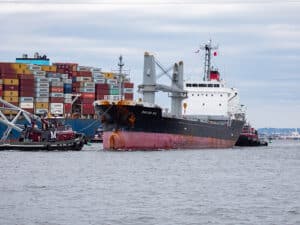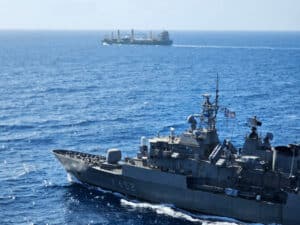
Neptune Lines orders two next-gen car carriers
Written by Nick Blenkey
Both new dual fuel Neptune Lines vessels will have hybrid energy systems that use battery installations to supply peak power. [Image: Neptune Lines]
Forecasts for global passenger car sales remain optimistic and car carrier specialists are responding by investing in new capacity. That includes Piraeus-headquartered Neptune Lines which has placed an order at China’s Fujian Mawei shipyards for two next generation vessels. At 4,200 CEU (car equivalent units) capacity, they are specially designed for Neptune Lines short sea trades and,.
The dual fuel PCTCs (pure car/truck carriers) are set for delivery in 2026. They are the first of a series that Neptune says reflect its strategy of suppleming its fleet over the next decade, to increase capacity by 36% from its current core fleet vessels and to reduce emissions to remain well ahead of global targets.
Both new vessels will have hybrid energy systems that use battery installations to supply peak power. With a high-pressure two stroke engine, they will be LNG/VLSFO fueled and use a controllable pitch propeller with shaft generator and multiple thrusters for propulsion and maneuvering of the vessels. Shore power capability will be installed, able to connect to port grids when available to remove emissions when in port. The design has been developed together with Deltamarin and the vessels will be classed by DNV.
Deltamarin says that design work on the vessels began in 2020 by analyzing the means and technologies to enhance the environmental and operational performance of the future fleet. It has no been awarded an engineering contract by Fujian Mawei Shipbuilding that is a direct continuation of the work and includes the complete basic and detail design of the vessels.
The ship has been designed taking advantage of Deltamarin’s digital design methods, which are aimed at optimizing the vessel for its future operational scenarios to achieve maximum fuel and environmental efficiency during operation. A core part of digital design is energy system level simulations (energy model) for determining the ships fuel consumption and environmental footprint.
“We are proud that Neptune Lines has chosen us as the designer for their next generation PCTC vessels and are pleased with the excellent co-operation between participating parties throughout the design development. Secondly, we look forward to working with Fujian Mawei Shipbuilding, providing them with engineering services and supporting them in the execution of this cutting-edge newbuilding program for Neptune Lines,” says Deltarmarin CEO Janne Uotila.
The work starts immediately and will be carried out at Deltamarin’s offices in Finland.




